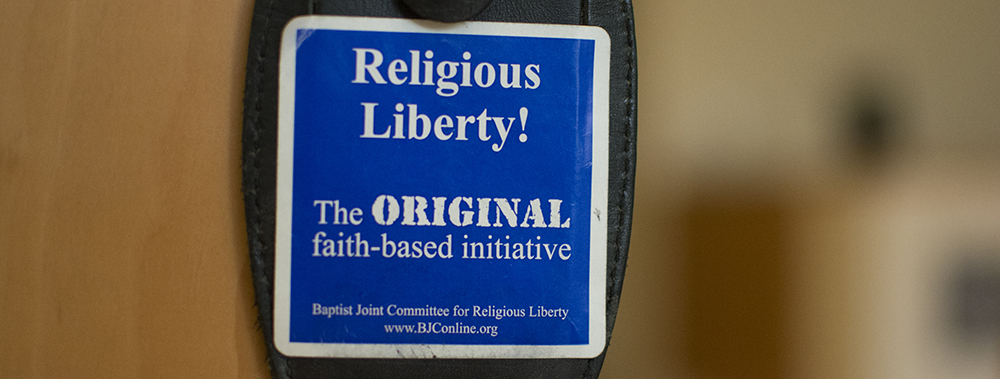
By BJC General Counsel Holly Hollman
Years ago, the BJC produced bright blue stickers that said “Religious Liberty! The original faith-based initiative.” People loved them. It was a succinct reminder of our foundational principles prepared in response to confusing and controversial executive action. At the time, President George W. Bush was promising to expand the role of religious organizations in government-funded programs. He was also creating government offices dedicated to promoting what came to be known as the “faith-based initiative.” As the initiative has changed and shifted focus through the Bush and Obama presidencies, it has provided religious liberty lessons and continuing challenges for the future.
The BJC responded with more than stickers, of course. We care about how the institutions of government and religion interact, especially when it comes to financial entanglements, which we know can harm both. Guided by first principles, including guarding church-state separation as an essential means for protecting religious liberty, we warned against “the wrong way to do right.”
Our advocacy during the Bush era was a continuation of efforts the decade before. We were early critics of “charitable choice,” a legislative proposal inserted into a handful of social services laws aimed at increasing participation of religious organizations in government-funded programs. In our view, there was no need to “level the playing field” for religious organizations to participate in the provision of federally funded social services. In fact, there had long been a tradition of religiously affiliated organizations providing social services for those in need, at times with government funds, acting within constitutional boundaries and without religious discrimination in government-funded programs. The BJC was skeptical about efforts to fix something that was not broken.
By highlighting our concerns, including the prospect of government-sponsored religious discrimination, the BJC and its allies defeated the Bush administration’s effort to expand “charitable choice” legislation across the federal government. Bush then pursued his policy through a series of Executive Orders that outlined guidelines for partnerships between religious organizations and the government. We met with administration officials and tried to strengthen protections. The guidelines included essential, but minimal, constitutional standards to prevent federal dollars from funding inherently religious activities and to prevent religious discrimination in the distribution of social services. The Bush administration resisted other safeguards and continued to emphasize the rights of religious organizations, often at the expense of religious liberty protections for individuals. Particularly troubling, the president signed an Executive Order exempting religious institutions from the ban on religious discrimination in federal contracts, an issue that remains highly controversial today.
Though some religious liberty advocates urged him to shut them down (the BJC did not), President Barack Obama maintained the faith-based offices and put his own stamp on the initiative. A former constitutional law professor and community organizer who had worked with religious organizations, he had a unique perspective of the promises and perils of such partnerships. He first amended one of President Bush’s Executive Orders and renamed the office the “White House Office of Faith-based and Neighborhood Partnerships,” placing an emphasis on the variety of organizations that government would work with to accomplish its goals. At the same time, he established a bipartisan advisory council to guide the work of the office and a task force dedicated to shoring up the constitutional and legal basis of the offices and policies.
The advisory council’s recommendations formed the basis of an Executive Order and administrative process that brought more transparency and clearer safeguards for religious organizations and the beneficiaries of social services. Government funding cannot be used to fund “explicitly religious activities,” such as worship, religious instruction or proselytization. Beneficiaries must be given written notice of their rights, and services must not be conditioned on any religious requirement. Today, there is wide agreement that these regulations reflect important protections for religious liberty – both for organizations providing services and beneficiaries who receive them.
The issue of discrimination in government-funded jobs remains a source of division. Despite Obama’s campaign promise to the contrary and consistent lobbying by religious liberty and civil rights advocates, the troublesome policy exempting religious organizations from the prohibition on religious discrimination with federal funds remains. While religious organizations enjoy special solicitude under the law to ensure religious autonomy, including exemptions from laws that prohibit religious discrimination in employment, no one should be denied a federally funded job because he or she is the “wrong” religion.
Religious liberty means protecting individuals and religious institutions. Through tremendous efforts to increase clarity, consistency, transparency and accountability in the rules that govern them, our country’s faith-based partnerships have been strengthened. Growing conflicts, however, over LGBT rights and religious objections to same-sex marriage threaten to exacerbate divisions on discrimination in government-funded jobs. As we monitor Congress, the courts and the executive branch, the BJC will continue to encourage responsible exercise of our religious freedom in ways that not only comply with the law but that are constructive and fair, to ensure it for the future.
From the January/February 2017 edition of Report from the Capital. You can also read the digital version of the magazine or view it as a PDF.




